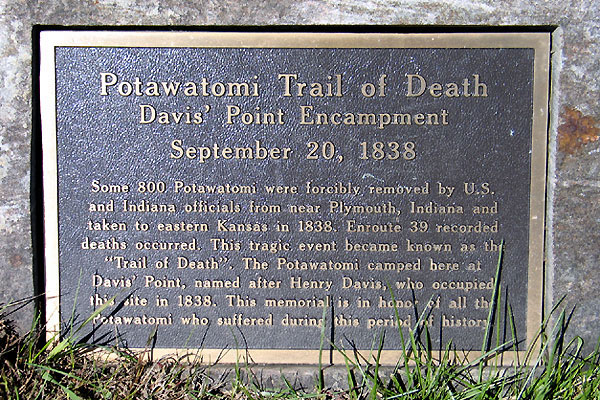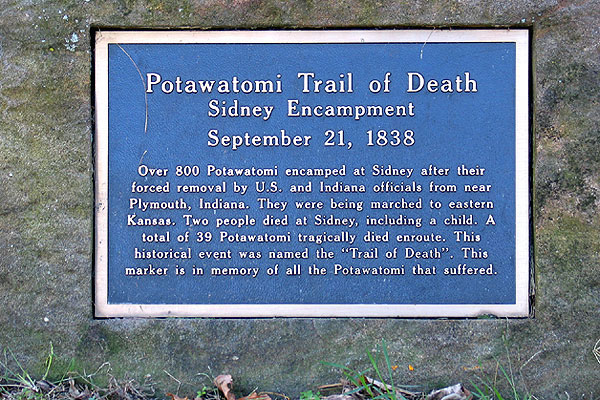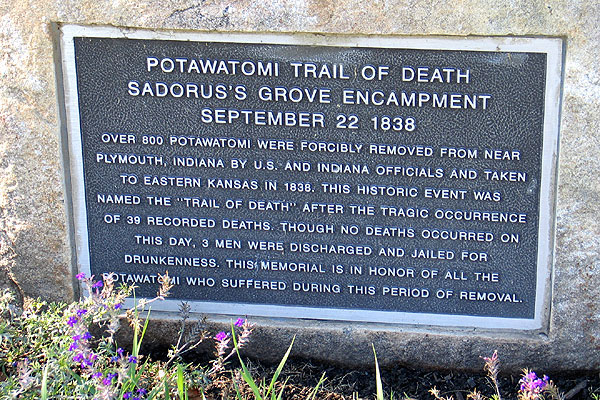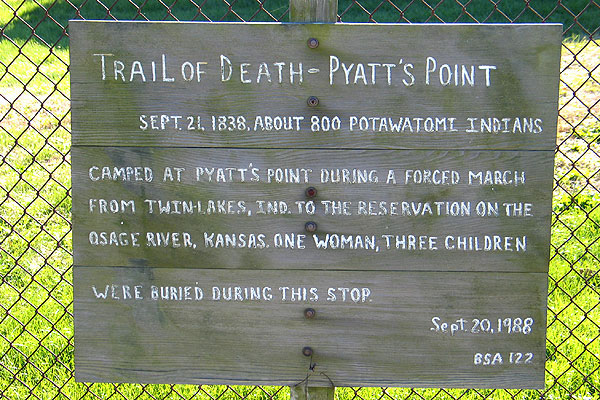D) The Trail of Death
In August, 1838, the Indians at Twin Lakes were taken unawares and herded together by John Tipton and volunteer militia, chiefly from Cass County, and, with the exception of a few who temporarily escaped, were escorted to Danville, Illinois. There they were turned over to William Polke, who conducted them the rest of the way across Illinois, Missouri, and part of eastern Kansas, to their future reservation in the neighborhood of the Osage River.
Father Petit, the indefatigable Catholic missionary among the Indians of northern Indiana and southern Michigan, learning of the forced departure of this group of his charges, hurried after the band, and continued his ministrations until they reached their destination.

Thursday, 20th September (Homer)
At 3 o'clock we were up and busily preparing the discharge of the volunteers. At sun rise they were mustered and marched to Head Quarters, where, after being addressed for a few moments by the General in command, they were discharged and paid off. Sixteen of the mounted volunteers, upon a requisition of the Conductor of the emigration were retained in service and are now under the immediate charge of Ensign Smith. At 9 o'clk. a few hours before which an elderly woman died, we prepared for our march. We left the camp at half past 9, and reached our present encampment at about 2 P.M. During the march of the party, Gen. Tipton who has heretofore been in command of the volunteers, and superintended the removal of the present emigration, took his leave, and left us in charge of the Conductor, Wm. Polke, Esq. While on the march a child died on horseback. A death has also occurred since we came into camp this Evening. We are now encamped at Davis's Point, a distance of ten miles from the camp ground of yesterday. To-morrow we expect to reach Sidney, which is reported to be a good watering place.

Friday, 21st September (Sidney)
Left Davis's encampment at half-past 9. At a little before 2 we reached Sidney, near the spot selected for encampment. The health of the Indians is the same - scarcely a change - the worst of the cases in most persons proves fatal. Physician reports for yesterday, "their condition somewhat better. There are yet fifty sick in camp - three have died since my last." The farther we get into the prairie the scarcer becomes water. Our present encampment is very poorly watered, and we are yet in the vicinity of timber. A child died since we came into camp. This morning before we left the Encampment of last night, a chief, Muk-Kose, a man remarkable for his honesty and integrity, died after a few days' sickness. Distance traveled to-day 12 miles. Forage not so scarce as a few days ago. Bacon we occasionally procure - beef and flour, however constitute our principal subsistence.

Saturday, 22nd Sept. (Sadorus)
At 8 o'clock we left our Encampment, and entered the Prairie at Sidney. The day was exceedingly cold. The night previous had brought us quite a heavy rain, and the morning came in cold and blustery. Our journey was immediately across the Prairie, which at this point is entirely divested of timber for sixteen miles. The emigrants suffered a good deal, but still appeared to be cheerful. The health of the camp continues to improve - not a death has occurred to-day, and the cool bracing weather will go far towards recruiting the health of the invalids. A wagoner was discharged to-day for drunkenness. Dissipation is almost entirely unknown in the camp. To-night, however, two Indians were found to have possessed themselves of liquor, and become intoxicated. They were arrested and put under guard. Some six or eight persons were left at Davis's Point this morning, for want of the means of transportation. They came in this evening. We are at present encamped at Sidoris's Grove, sixteen miles distant from Sidney. Water quite scarce.
The Trail of Death: Letters of Benjamin Marie Petit (1925)
Irving McKee

BACK // FORWARD // TABLE OF CONTENTS